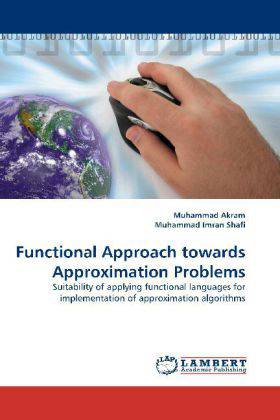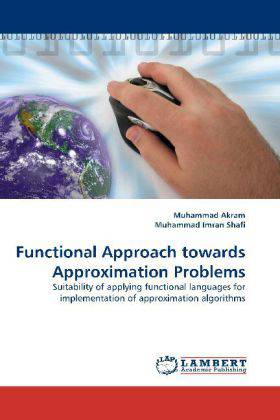
- Afhalen na 1 uur in een winkel met voorraad
- Gratis thuislevering in België vanaf € 30
- Ruim aanbod met 7 miljoen producten
- Afhalen na 1 uur in een winkel met voorraad
- Gratis thuislevering in België vanaf € 30
- Ruim aanbod met 7 miljoen producten
Zoeken
Functional Approach towards Approximation Problems
Suitability of applying functional languages for implementation of approximation algorithms
Muhammad Akram, Muhammad Imran Shafi
Paperback | Engels
€ 48,45
+ 96 punten
Omschrijving
Approximation algorithms are widely used for problems related to computational geometry, complex optimization problems, discrete min-max problems, NP- hard and space hard problems. Due to the complex nature of such problems, imperative languages are perhaps not the best solution when it comes to their actual implementation. Functional languages like Haskell could be a good candidate for the aforementioned issues. Haskell is used in industries as well in commercial applications, e.g. concurrent applications, statistics, symbolic math and financial analysis. Several approximation algorithms have been proposed for different problems that naturally arise in the DNA clone classifications. In this book, we have performed an initial and explorative study on applying functional languages for approximation algorithms. Specifically, we have implemented a well known approximate clustering algorithm in Haskell and in Java and we discuss the suitability of applying functional languages for the implementation of approximation algorithms, in particular for graph theoretical approximate clustering problems with applications in DNA clone classification.
Specificaties
Betrokkenen
- Auteur(s):
- Uitgeverij:
Inhoud
- Aantal bladzijden:
- 112
- Taal:
- Engels
Eigenschappen
- Productcode (EAN):
- 9783838363509
- Verschijningsdatum:
- 19/05/2010
- Uitvoering:
- Paperback
- Formaat:
- Trade paperback (VS)
- Afmetingen:
- 152 mm x 229 mm
- Gewicht:
- 176 g

Alleen bij Standaard Boekhandel
+ 96 punten op je klantenkaart van Standaard Boekhandel
Beoordelingen
We publiceren alleen reviews die voldoen aan de voorwaarden voor reviews. Bekijk onze voorwaarden voor reviews.











